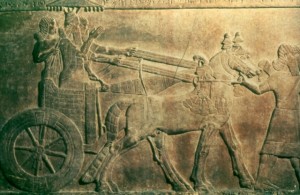Iraq and the Jewish People: The Era of the Kings in Israel
Part II
Moving from the time of Abraham through the age of the patriarchs, the exodus from Egypt (roughly 1250 BCE), and the period of the Judges, Mesopotamia appears in Jewish life once again in the time of the kings.
Egypt, over the course of that period, was the main power in the Land of Israel.
This period, the Bronze Age, was, in fact, characterized by the domination of Egypt. However, competition for the land bridge between the region to the north, Mesopotamia, and the region to the south, Egypt, was constant. Egypt had taken control of the territory in the year 2500 BCE. Scholars have noted that one of the reasons that the Israelites did not enter Israel through the Philistine shore, or what is today the Gaza Strip, was the Egyptian garrisons in place. Excavations have revealed these very garrisons.
Mesopotamia wished for control of this region. This finally materialized in the period of the kings. After the death of King Solomon and the division of the empire at the end of the 10th century BCE, Mesopotamia was better positioned to take control.
Biblical stories, while more obviously about religious history, are also accounts of political events. Reading the subtext within the religious history, one can identify the political reality of the time. The political reality during the period of the kings comprised two political parties within the upper crust of the society in northern Israel and in Judea. One group believed in allying with Egypt; the other felt that the best option would be to ally with Mesopotamian powers—at first Assyria and then Babylonia after the fall of the Assyrian empire.
This conflict caused great difficulties for the Jewish people. Assyria, where the drama first unfolded, was a giant empire. The kings of northern Israel were meant to be under its sphere of influence. The earliest power in Mesopotamia was Sumer in the south; however, power had shifted to the north, to Assyria, and the Assyrian empire was ready to consume all others in the cruelest possible fashion. This is evident in texts left to us and in pictures showing how their enemies were treated, much of which can be found in the British Museum and other museums.
Almost inexplicably, the north Israelites did not understand that exerting independence would be impossible given the circumstances. They defied authority to a great extent, rejecting the religion—which had made certain inroads into Israel, as is seen very clearly with King Manasseh—and refusing to pay tribute to Assyria. Assyria invaded in 733 BCE under Tiglath-Pileser, destroying large amounts of territory and taking some exiles to Iraq.


Leave a Reply